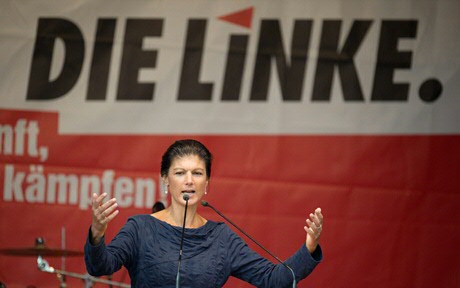Alumna in Germany: Sahra Wagenknecht
Text: Annemieke Hendriks; Source: Broerstraat 5
Sahra Wagenknecht (Jena, East Germany, 1969) is one of the most prominent politicians in the Federal Republic of Germany. Since 2015, she has been co-chair of DIE LINKE (the Left Party) in the Bundestag, together with Dietmar Bartsch. She owes her beautiful facial features and appearance – with which she also impresses many of her political opponents – partly to her Iranian father. Above all, however, she is praised for her thorough knowledge of economic developments both in Germany and the rest of the world. Dr Wagenknecht is a familiar face on talk shows, where she shares her knowledge with an engaging dose of Marxist philosophy.

And the University of Groningen had a role to play in that. Sahra Wagenknecht studied philosophy in Groningen from 1995 to 1996, where she obtained her Master’s degree. ‘I wanted to do my Master’s thesis on the Hegelrezeption des jungen Marx [Marx’s interpretation of Hegel], she explains, ‘but in Germany, I couldn’t find a suitable thesis supervisor – in Groningen, I did.’ After the fall of the Berlin Wall, attitudes at German universities quickly changed (“westernized”), and her chosen theme was apparently too communist. But Hans Heinz Holz, an unorthodox West-German Marxist philosopher, had been teaching at the University of Groningen since 1978, and he was more than happy to supervise Sahra.
‘I liked it in the Netherlands anyway. The atmosphere at the University was very open. And I liked the city of Groningen, with its old buildings, nice restaurants and cycling culture.’
Wagenknecht went on to do to a PhD in economics in Chemnitz. What worries her most in Germany, she says when asked, is how politics is widening the gap between rich and poor. This gap is already greater in her homeland than it is in the Netherlands. ‘Since the last financial crisis, there has even been a redistribution from bottom to top. More and more people are becoming socially marginalized, so they are then more receptive to the ideas of right-wing demagogues.’
Wagenknecht is aware that the social safety net in Germany is much less extensive than the system in the Netherlands. Even the legal minimum wage has only recently been introduced, is relatively low and has endless exemptions. ‘The good thing is that there's more and more resistance. There are campaigns in the healthcare sector against staff shortages and underpayment. People are taking to the streets to protest excessive rents and passive climate policies.’
As a fiercely left-wing politician, she is keen to capitalize on this, ‘as well as on the criticism of the social system, pension accrual and property rights’. On that last point, she is referring to a heated and controversial debate. The leader of the Jusos, the youth wing of the relatively moderate Social Democratic Party (SPD), recently surprised friend and foe with his proposals to restrict home ownership to personal use and to nationalize BMW.
Earlier this year, Sahra Wagenknecht was out of the running for a few months due to stress. An internal party dispute also arose over the populist tone with which it wanted to lure aggrieved right-wingers. This autumn, she will be stepping down from her role as party chair, but she continues to be as combative and committed as ever.
‘I will continue to push for a cultural change in German politics towards a more equal distribution of prosperity. To do that, you need a good plan. Because how can we persuade both the protesters and those disappointed with neo-liberal politics to unite on the left?’ Her Left Party has yet to reach the 10 percent mark in terms of voters. ‘How can we win people back? How can we mobilize them? That’s the main challenge for both Die Linke and myself.’
